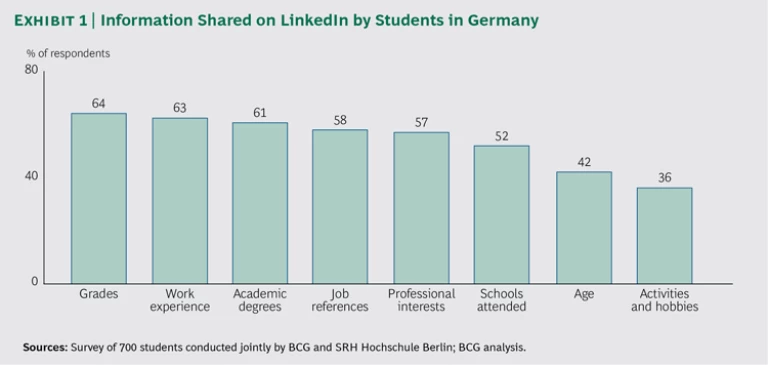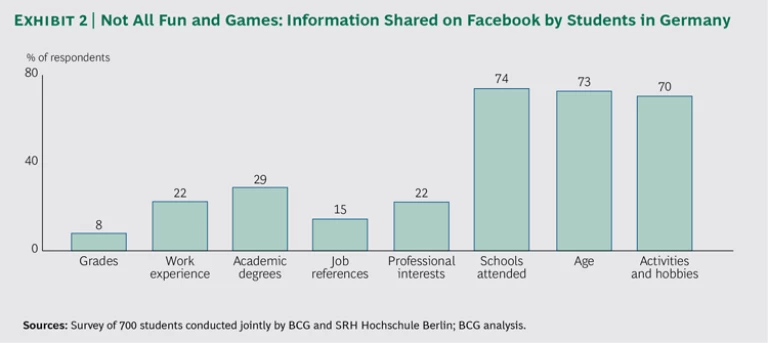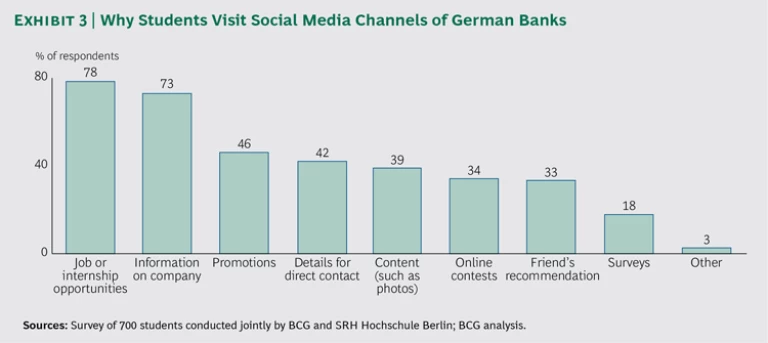Banks in Germany are facing challenges in recruiting recent graduates. The lingering effects of the global financial crisis still weigh on the desirability of banks as places to work, and many young people consider the industry to be behind the times.
Social media give banks a chance to improve their recruiting. But to exploit this emerging channel, banks must pursue it actively. Most notably, they need to view social media not simply as a brand-building channel but as a recruitment channel.
To better understand the possibilities of social media recruiting, The Boston Consulting Group partnered with SRH Hochschule Berlin, a leading business school, to
Social media recruiting is an underutilized channel. More than 99% of the survey respondents had at least one social-media account, and two-thirds used Xing, the German-language recruiting site, and LinkedIn to network and to publicize their accomplishments. But these students still relied much more heavily on banks’ websites and on Web searches to learn about potential employers.
Half of the respondents found their last internship online, while the other half found it through other channels, such as recommendations and schools’ career-services offices. Only 2% found their last internship through social media.
Students are disappointed in the social media offerings of German banks. If German banks want to use social media to attract job candidates, they will have to do a better job of tailoring those channels to their needs. Almost 80% of the respondents said they would visit the social media profiles of a German bank to look for a job or an internship, and 9% of the respondents actually applied for a position after they saw it advertised on social media. But students are largely dissatisfied with the overall career-development content on banks’ social-media channels, ranking it lower than general social-media content and design.
Recruiting social-media sites are not the only game in town. While Xing and LinkedIn are the clear market leaders in social media recruiting, students are increasingly willing to share professional information on Facebook. Nearly one-third of the respondents display their academic degrees on Facebook, and almost one-quarter show work experience and professional interests. (See Exhibits 1 and 2.)
Given Facebook’s incredible penetration of 99% among the survey respondents, these disclosures provide significant insight into a huge pool of potential employees. Facebook also attracts twice as many followers as LinkedIn or Xing among students interested in working for German banks, allowing the banks to extend their networks and use social media as a talent pipeline. In light of these findings—underutilization of channels by banks, disappointment by students, and the relevance of Facebook—how should banks respond? Below are three ways.
Show Me the Jobs
Survey respondents visit social media channels to learn about job or internship opportunities. That was the reason cited by more than three-quarters, or 78%, of survey respondents for going to a bank’s social-media channel. (See Exhibit 3.) Unfortunately, few banks offer jobs and internships through this channel. Only 2% of the survey respondents actually found their most recent internship through social media. In contrast, 47% found it through an online search and 28% through a recommendation.
Banks should expand their social-media channels to capture this untapped demand. The social media channels of most German banks are currently populated with general information. But survey respondents are more likely to visit traditional websites, conduct Web searches, and reach out to their professional networks to acquire that information, according to the survey. There’s nothing wrong with banks using social media for general brand building, but it should be supplemented by strong career content and job opportunities.
Survey respondents rated the employment-related content on the social media channels of German banks as consistently weaker than their overall messaging and design. Yet social media channels allow banks to connect directly with potential applicants—something that most respondents said they were willing to do. More than three-quarters of the survey respondents who used Xing said they would connect with a headhunter through social media channels. More than two-thirds of LinkedIn users were willing to do so, too.
Facebook Matters
Many employers mistakenly do not view Facebook as a recruiting channel. While it may not rival LinkedIn or Xing as a talent acquisition channel in the medium term, it’s too big to ignore. Respondents said that they were slightly more likely to visit Facebook than LinkedIn to seek information about a bank. Moreover, 42% said they would connect with a recruiter at a potential employer through Facebook.
Given Facebook’s wide reach, banks can create awareness and generate a network effect on the site. For example, 63% of the respondents said they would be more likely to sign up for a job-related workshop if they saw that their friends were attending.
Define Your Social-Media Strategy
Social media channels continue to serve valuable roles in marketing, brand building, and customer feedback. It can be challenging to manage these roles and engage in talent acquisition. To overcome this challenge, companies should think about launching separate career-development presences on social media, similar to their career websites. Nearly three-quarters, or 73%, of the survey respondents, for example, said that they would like banks to have a separate career profile on Facebook.
The career content on social media channels should be clearly identified and offer specific jobs and internships. It should be clearly segregated from traditional social-media content. Ideally, separate teams—likely marketing and HR—should manage these two activities.
At a time when German banks are having recruiting challenges, social media represent a new source of talent acquisition. Banks can tap into the network effects of social media and their vast amount of relevant data to bring in more and better young recruits than their competitors.







